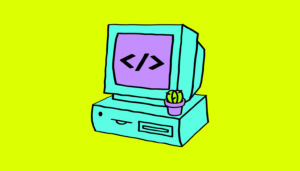Key Takeaways:
-
- 66% of developers worry about AI replacing humans.
-
- 92% of developers feel pressure to use AI tools to stay competitive.
-
- 67% of developers are confident in the safety and security of AI-assisted code.
-
- 90% of developers work under policies that support AI-assisted coding.
Developers face increasing pressure to adopt AI-assisted coding tools, but many are uncertain about their implications for job security and the future of their roles in the development process.
While AI promises to boost productivity, a significant portion of developers worry it could replace humans or diminish their involvement.
To shed light on these concerns, we surveyed 410 developers to understand how they truly feel about AI-assisted coding. Dive into the results below to explore how they’re navigating this new frontier.
What Is AI-Assisted Coding?
AI-assisted coding is the use of artificial intelligence tools to help software developers write, debug, and optimize code more efficiently.
These tools enhance productivity by offering real-time code suggestions and automated assistance. For example, GitHub Copilot uses OpenAI models to suggest code completions based on the context of what a developer is writing.
This streamlines development workflows, reduces repetitive tasks, and helps programmers focus on solving higher-level problems.
What Counts as AI-Assisted Coding?
AI-assisted coding involves using artificial intelligence to provide context-aware support during software development.
These systems interpret your code in real time, offering intelligent assistance through suggestions, error detection, or automated testing. Common forms of AI assistance include:
- Code suggestions: Predictive completions based on the code you’re actively writing
- Bug detection: Identifying errors, security issues, or inefficiencies in real time
- Test generation: Creating unit tests based on the logic and structure of your code
- Natural language to code: Converting written prompts into functional code blocks
- Smart recommendations: Offering best practices or design patterns based on project context
Most Developers Fear AI Will Replace Human Roles
While an AI developer is one of the highest-paying software engineering jobs, many fear the implications of AI in coding.
The rise of AI in software development is triggering widespread anxiety among developers. These concerns center on AI’s potential to automate tasks traditionally handled by humans.
Our data underscores how deeply this sentiment is felt across the developer community:
- 66% of software developers are concerned about AI replacing humans in the development workflow.
- Nearly one-third of developers show extreme concern about AI replacing human development roles.
- Only 23% of software developers are not concerned about AI replacing human developers.
The fact that nearly 2 in 3 report some concern suggests this isn’t a fringe view—it’s a mainstream worry that could influence how teams adopt and govern AI tools moving forward. Many developers fear AI could devalue their roles or lead to job displacement.
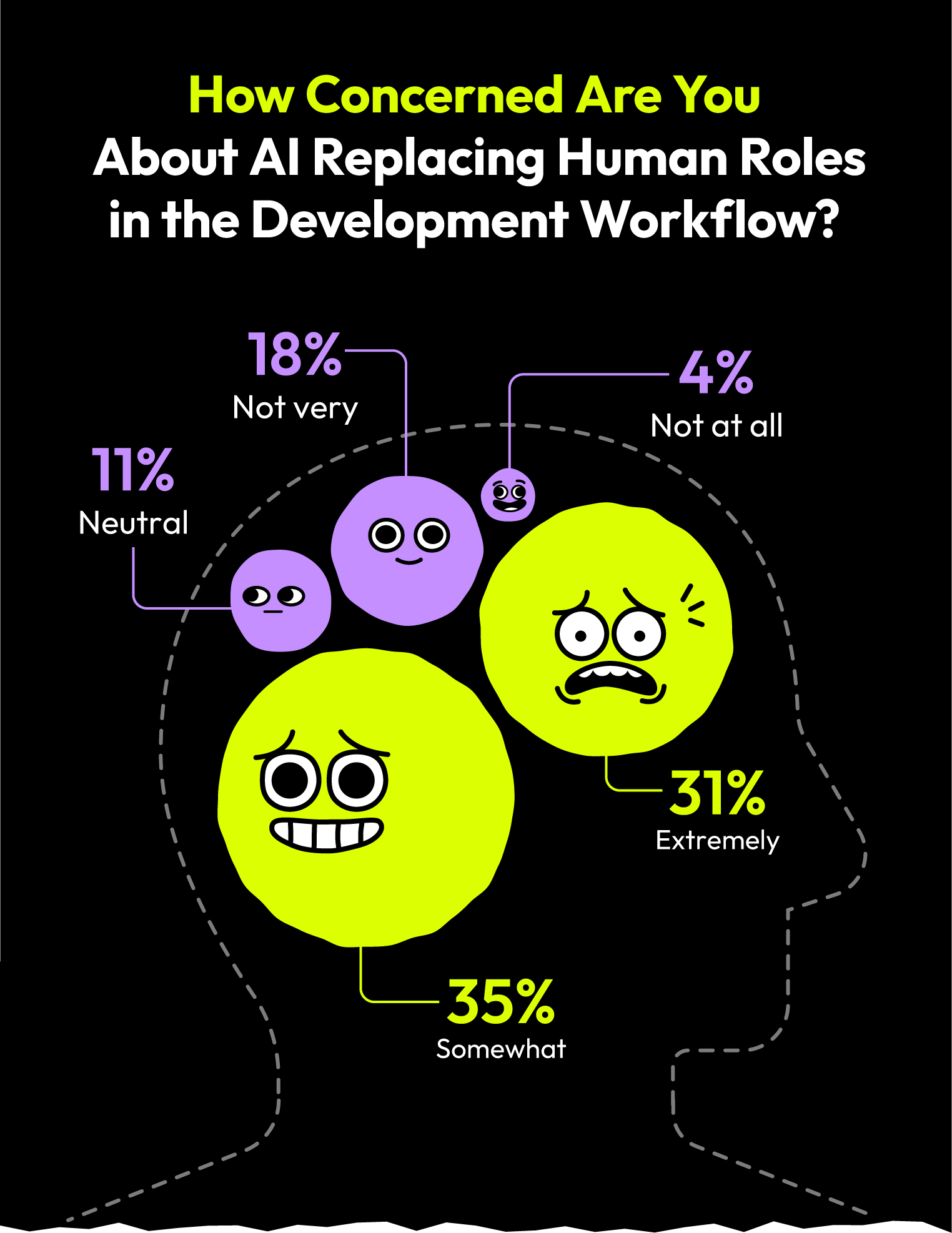
Most Developers Feel Pressured To Adopt AI
Software developers are feeling real pressure to adopt AI just to stay competitive. This pressure isn’t limited to isolated moments; for many, it’s a regular part of the job.
Our data shows that:
- 92% of software developers have felt pressure to adopt AI coding tools to be competitive at some point in their careers.
- 59% of software developers frequently or constantly feel pressured to adopt AI coding tools to stay competitive.
- 41% of developers occasionally, rarely, or never feel pressured to use AI coding tools.
- Only 8% of developers have never felt pressure to adopt AI coding tools.
These findings suggest that AI adoption in development is driven as much by perceived career risk as it is by interest or productivity gains. The majority of developers are responding to an industry-wide signal that using these tools is becoming table stakes.
This kind of sustained pressure could reshape how developers learn, how quickly new tools are integrated, and how teams evaluate performance or hire developers (sometimes at the expense of careful vetting).
AI fluency is an unspoken requirement for staying relevant in the field.
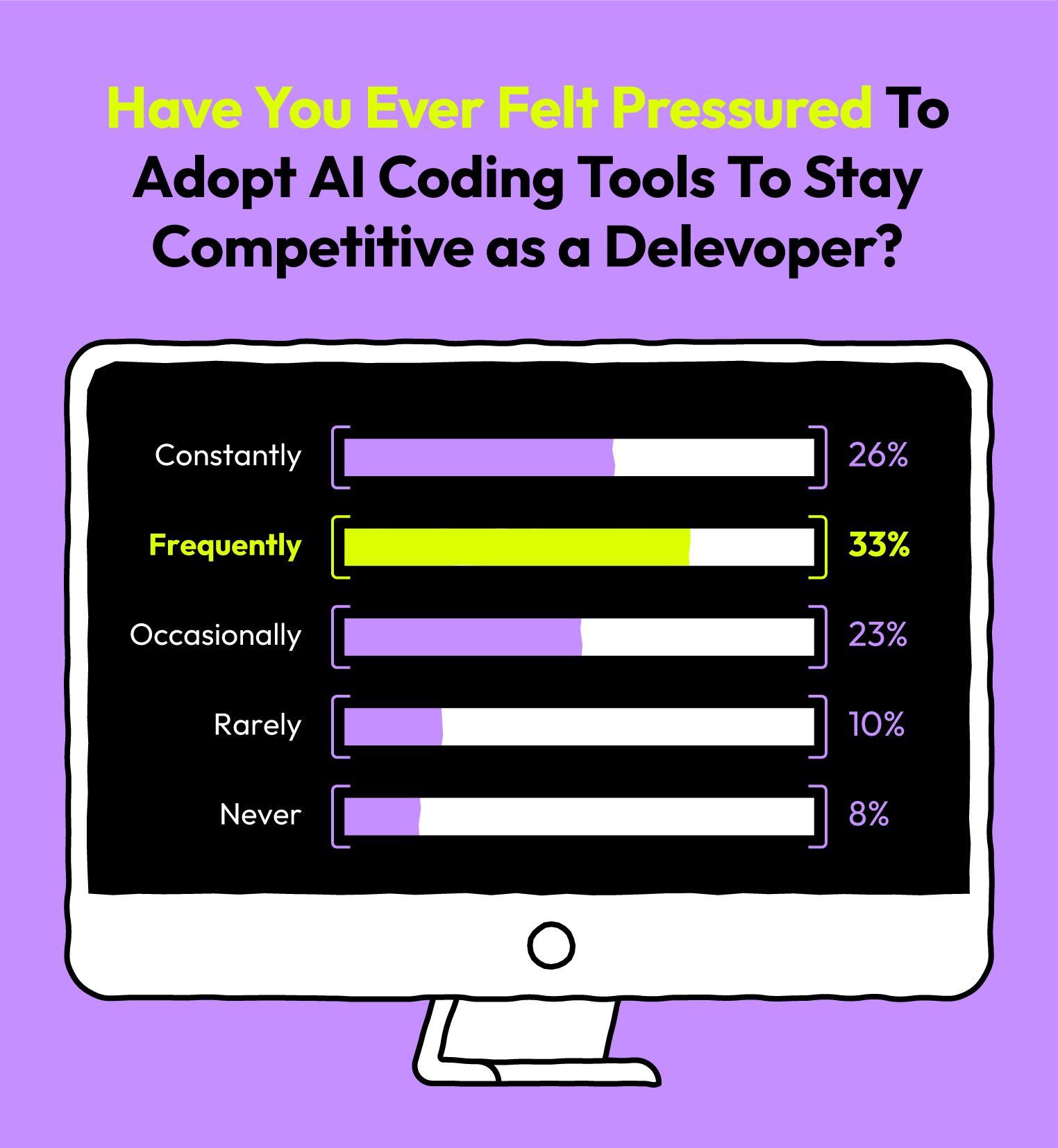
Developers Trust AI-Assisted Code (But Not Without Doubts)
Confidence in AI-assisted code is growing, but acceptance isn’t universal. While most developers say they trust the safety and security of AI-generated code, a meaningful minority remain skeptical or unsure.
Our survey found that:
- 67% of developers are somewhat or very confident about the safety, security, and readiness of AI-assisted code.
- Only about one-fifth of software developers are not very or not at all confident in the safety, security, or readiness of AI.
- 88% of developers have an opinion about the safety of AI-assisted coding.
- 12% of developers don’t have an opinion about the safety, security, or production readiness of AI-assisted code.
These findings suggest that trust in AI-assisted development is solidifying, but not without friction. A notable share of developers remain cautious. The developers without an opinion may reflect a cohort still evaluating or newly adopting these tools.
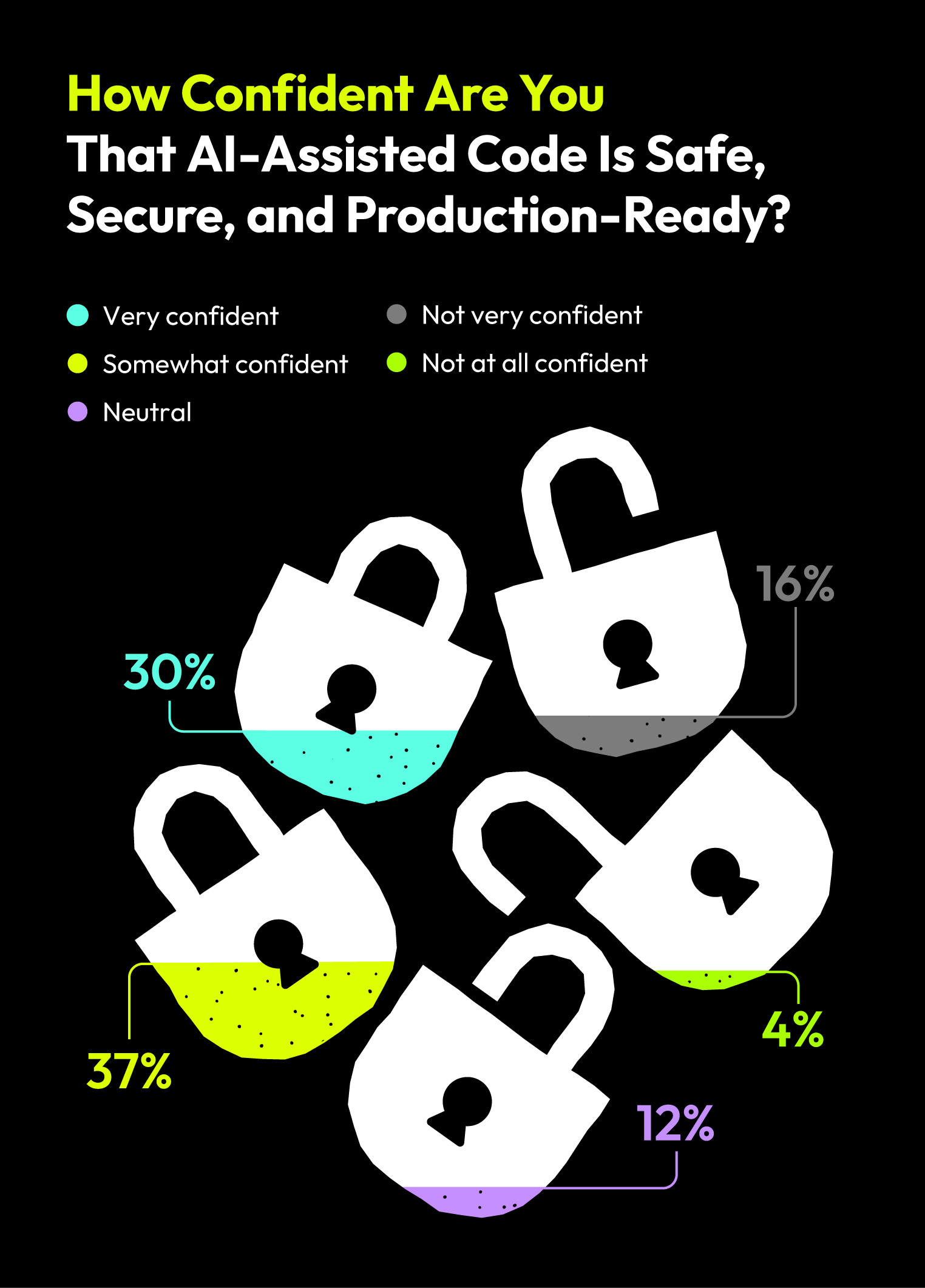
Developers Are Driving AI Coding Tool Adoption
AI-assisted coding tools are becoming a standard part of the development landscape, but how teams integrate them varies significantly. Some organizations are fully embracing these tools, while others remain more cautious.
Our findings show:
- 90% of developers work under policies supporting AI-assisted coding.
- 43% of developers work for companies encouraging the use of AI-assisted coding tools across their team.
- About one-third of developers use AI-assisted coding tools independently (even when they’re not actively encouraged).
- Only 1 in 10 developers have policies against or actively avoid AI-assisted coding tools.
- 16% of software development companies are experimenting with these tools but haven’t formalized usage.
The majority of organizations recognize the value of AI-assisted coding tools and are taking steps to integrate them into their workflows. However, the varying degrees of adoption suggest that there is still uncertainty around how to best implement these tools.
The significant portion of developers using AI tools independently suggests that individuals are increasingly taking matters into their own hands and driving adoption, even without formal company policies.
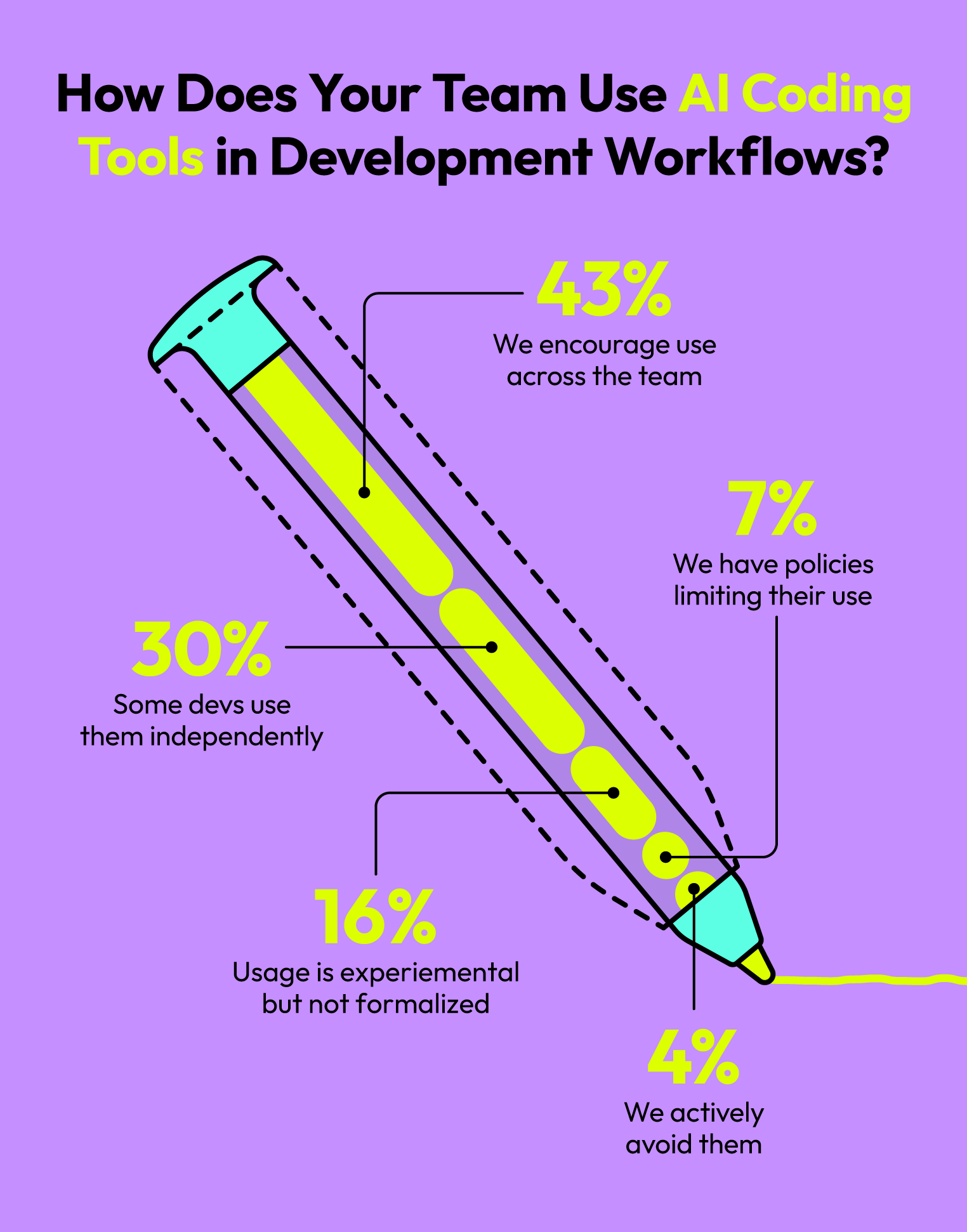
AI Tools Transform Developer Collaboration
AI tools are reshaping the developer experience, enhancing team collaboration dynamics while also creating some challenges. As AI becomes more integrated into the development workflow, the effects on collaboration vary across teams and individuals.
Our findings show:
- 75% of developers say AI tools have changed the way they collaborate with other developers.
- 55% of developers say collaboration has improved with AI tools
- Roughly 1 in 5 developers say AI hasn’t affected the way they collaborate with other developers.
- 19% say collaboration has become more fragmented due to AI tools.
- Only 4% of developers aren’t sure or think it’s too early to tell if AI tools have changed the way their teams collaborate.
These findings suggest that while AI tools are driving improvements in collaboration for most developers, a notable percentage still experience fragmentation or see no change at all.
Improved collaboration suggests that AI is generally seen as an asset for teamwork. However, the respondents who feel AI has fragmented collaboration signal that it can lead to misalignments, especially if developers use different tools or rely on it without proper oversight.
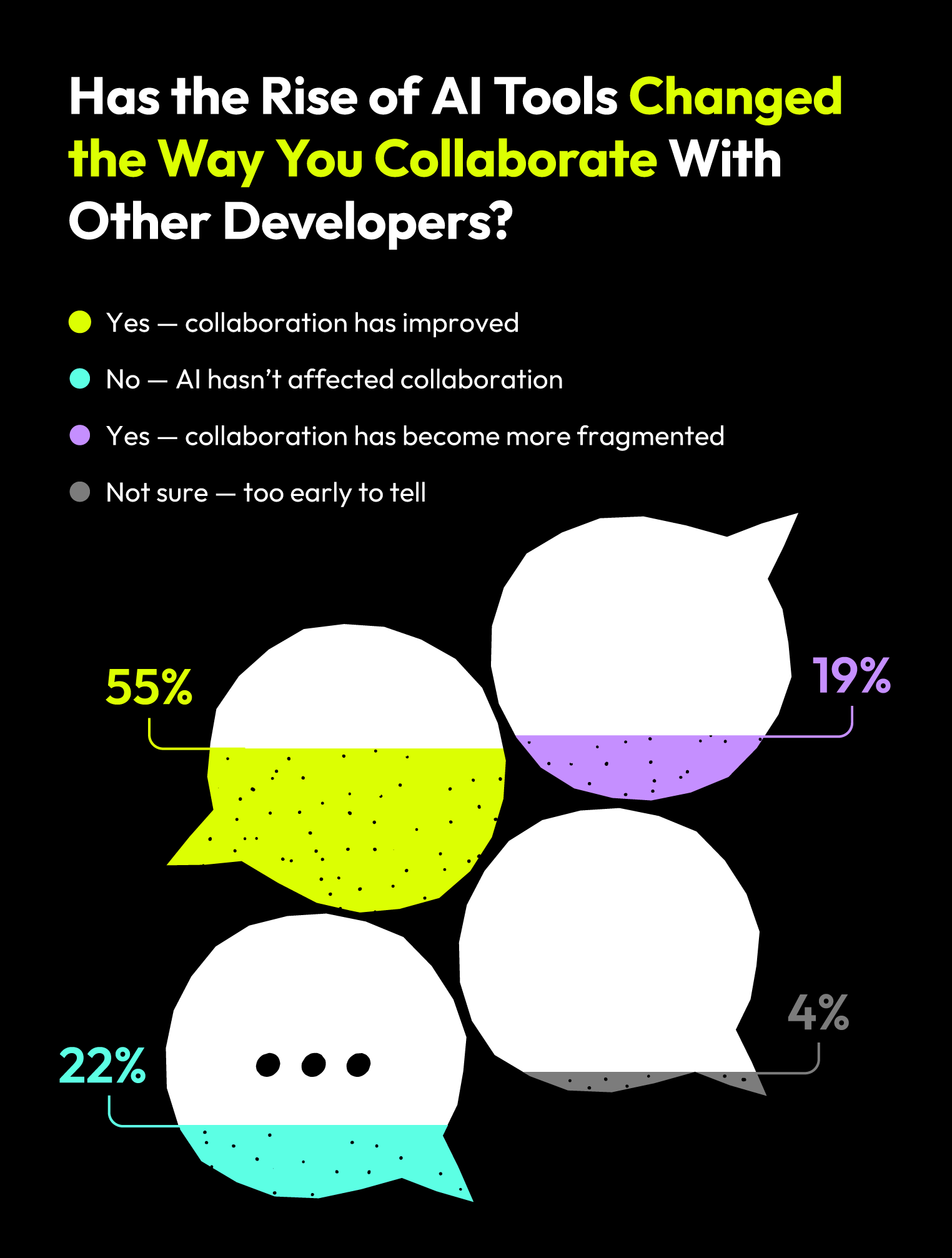
What Are the Risks and Benefits of AI-Assisted Coding?
AI-assisted coding brings both significant advantages and potential challenges that organizations and developers must carefully consider. The following table explores the primary risks and benefits:
Risks
- Job displacement: AI could replace human roles in coding, causing job loss or devaluation of developer positions.
- Security vulnerabilities: AI-generated code may contain errors or security flaws that developers miss.
- Over-reliance on AI: Developers might become too dependent on AI, reducing their problem-solving skills and creativity.
Benefits
- Increased productivity: AI tools speed up coding, automate repetitive tasks, and improve overall efficiency.
- Enhanced quality assurance: AI-assisted tools help identify bugs and optimize code, leading to more reliable software quality assurance.
- Streamlined workflows: AI can simplify and automate mundane tasks, allowing developers to focus on higher-level challenges.
10 Most Popular AI Coding Tools
AI-assisted development tools are rapidly becoming essential in modern software workflows. The following tools streamline everything from real-time code suggestions to test generation and bug detection:
- Cline: A lightweight command line AI pair programmer that lets developers interact with models like GPT-4 directly in their terminal
- Cursor: A code editor built on VS Code that integrates GPT to offer in-line code suggestions, debugging help, and natural language search
- Aider: A terminal-based AI pair programmer that works with your local Git repo to suggest and implement code changes using natural language prompts
- Windsurf: Formerly Codeium, Windsurf delivers fast, context-aware code completions across more than 70 programming languages
- GitHub Copilot: Trained on billions of lines of code, Copilot suggests real-time completions and entire functions directly in your IDE
- Visual Studio IntelliCode: An extension for Visual Studio that uses machine learning to recommend smart code completions based on team practices and open-source patterns
- Amazon CodeWhisperer: Converts natural language prompts into fully functional code snippets, especially helpful for cloud-based development
- DeepCode: Uses AI to review your code for potential bugs and security vulnerabilities, offering explanations and suggestions for fixes
- Qodo: Formerly CodiumAI, this tool generates meaningful unit tests by analyzing your existing codebase, helping you catch edge cases before shipping
- Tabnine: Provides AI-powered code completions trained on permissive open-source codebases, supporting a privacy-first approach to AI-assisted development
Hire Developers Fluent in AI-Assisted Coding
The demand for AI-related specializations continues to rise.
As AI becomes more central to development roles, hiring managers need to prioritize AI engineers and developers with a strong understanding of these tools.
Developers should embrace AI coding tools and proactively integrate them into their work. Those who foster AI adoption are more likely to drive innovation, improve efficiency, and enhance team collaboration.
In contrast, hiring those who resist AI may limit a company’s ability to adapt and thrive in an increasingly AI-driven industry.
Lemon.io connects businesses with thoroughly vetted engineers, ensuring you work with the top 1% of talent.
Hire the best software developers today!
Methodology
The survey was conducted by Centiment.co for Lemon.io. The survey was fielded between April 29, 2025, and May 1, 2025. The results are based on 410 completed surveys.
In order to qualify, respondents were screened to be residents of the United States, over 18 years of age, and working in software development. Data is unweighted, and the margin of error is approximately +/-3% for the overall sample with a 95% confidence level.



